#rosmarie waldrop
Quote
Summer arrives in a strawberry, sweet, juicy. As long as you feel its flesh on your tongue you’re unaware how. One minute inches into the next. But how could you observe awareness anyway? Or, for that matter, a thought? It grows in you, not as a sensation. (Nor like a baby or tumor.) An experience that you can’t hold on to. Any more than to the smell of lilac. Though it soothes emptiness.
Rosmarie Waldrop, from “Asymmetry (2)”, The Nick of Time: Poems
#q#lit#quotes#summer#poetry#rosmarie waldrop#asymmetry#the nick of time#glimpses#sing me a song of summer#life everlasting#reading#contemporary lit#m#x
1K notes
·
View notes
Note
hello <3 could you please do a webweaving on losing someone you love? thank you!

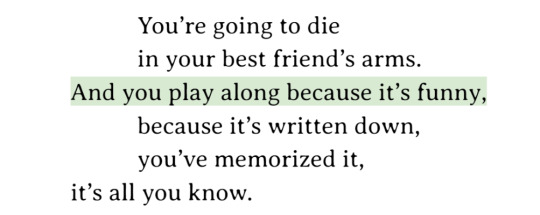

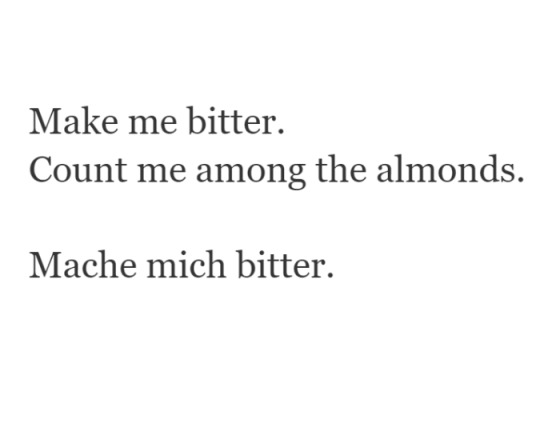
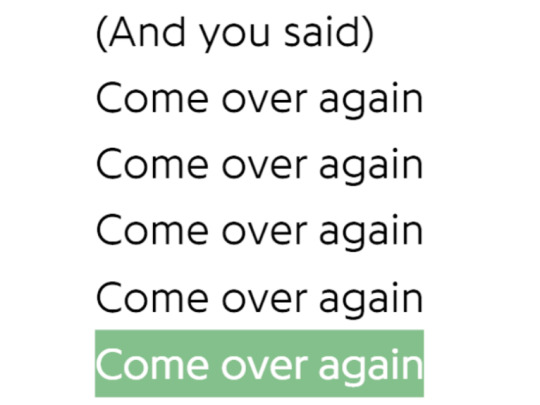

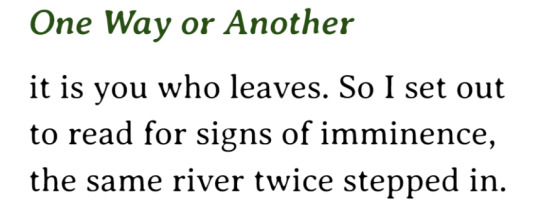


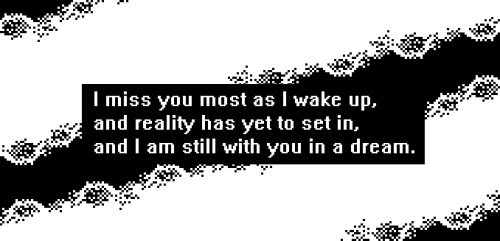



Either way, you're not coming back.
For whatever reason, I really struggled with this one. I wasn't sure if you meant loss as in dying or loss as in leaving, so I tried to make it applicable to both.
tender is not a bad word, K.C Cramm | Planet of Love, Richard Siken | A Self-Portrait in Letters, Anne Sexton | Count the Almonds, Paul Celan | Come Over (Again), Crawlers | A Valentine That Can’t Be Sent, Rosmarie Waldrop | Poetic Regulations, Mahmoud Darwish | Intimacy, Hanif Kureishi | @/small-planets | The Torn-Up Road, Richard Siken | Instructions for the End, Jen Benka | Norwegian Woods, Haruki Murakami
[transcriptions and image ID in alt text]
#webweaving#parallels#web weave#web weaving poetry#prose#compilation#webweaving loss#literature#on loss#༺✿ web weaves by basil ✿༻#requests#k.c cramm#richard siken#anne sexton#paul celan#rosmarie waldrop#mahmoud darwish#hanif kureishi#jen benka#haruki murakami
240 notes
·
View notes
Text
Intellectual compulsion towards truth.
— Friederike Mayröcker, The Vienna Group: Six Major Austrian Poets, transl by Rosmarie Waldrop & Harriet Watts, (1985)
#Austrian#Friederike Mayröcker#The Vienna Group#Six Major Austrian Poets#Rosmarie Waldrop#Harriet Watts#(1985)
18 notes
·
View notes
Text
Milestone Monday
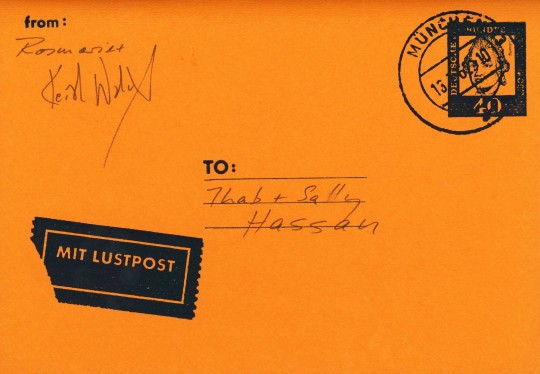
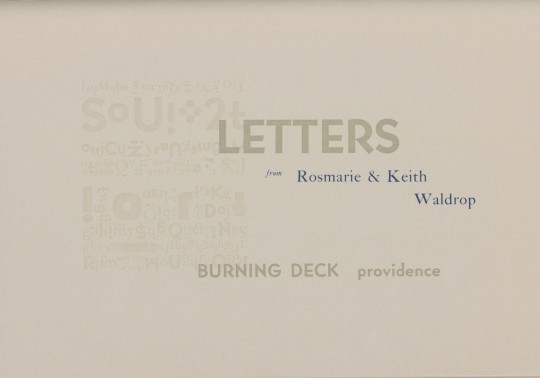


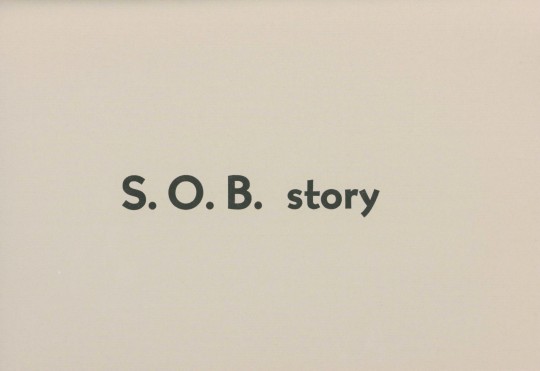

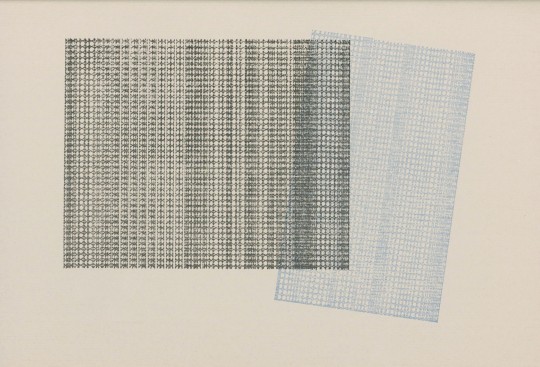
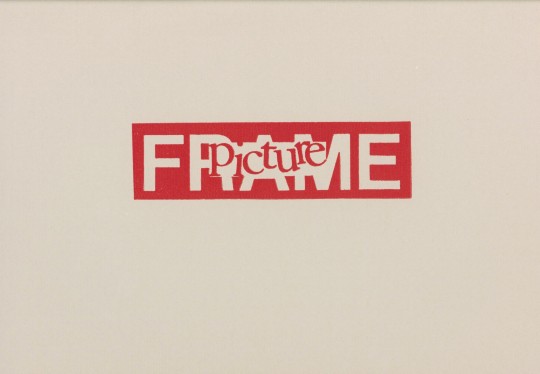


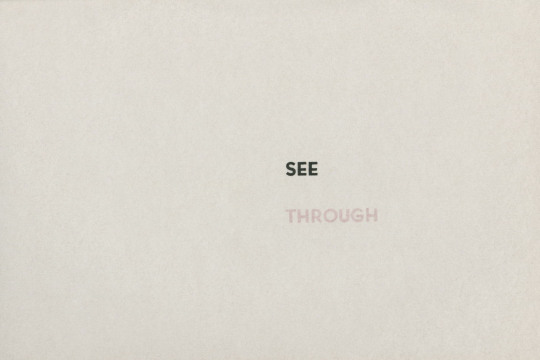
Today, December 11th, we celebrate the birthday of acclaimed poet Keith Waldrop (1932-2023). Waldrop was a prominent voice in American poetry and renowned translator of French literature. He was known for writing poetry that expressed a fascination with the world and philosophical perspectives. Waldrop met his wife Rosmarie (b. 1935) while stationed in Germany during the 1950’s and the two established Burning Deck Press in 1961 after settling in Providence, RI. The press was committed to publishing experimental poetry and prose for fifty-six years and closed in 2017.
In honor of Waldrop’s birthday, we’re sharing Letters from Rosmarie & Keith Waldrop. Published in 1970 by Burning Deck in an edition of 500 copies, Letters from Rosmarie & Keith Waldrop is a collection of concrete poetry that plays with the visual elements of typography. The couple collaborated on the book, alternating the authorship of each page to create a delightful conversation and graphic menagerie. Special Collections holds several of Keith and Rosmarie’s collaborations and over 120 Burning imprints accessible here.
View other Milestone Monday posts.
– Jenna, Special Collections Graduate Intern
#milestone monday#milestones#keith waldrop#birthdays#letters from rosmarie & keith waldrop#concrete poetry#rosmarie waldrop#burning deck press
13 notes
·
View notes
Text
The writer persists in playing with fire, for, in writing, “the body risks its own existence,” is devoured by, but also persists with the fire, is sustained by the very process which devours her. The drama of writing is a ritual. Anne-Marie Albiach mentions an image of Kafka’s that has stayed with her: a wrist circled by a gold ring “at the same time scar and ornament: as for the elaboration of sacrificial writing … as if the writer were to be sacrificed to the body of the text.” It is the wrist, whose movement is the crucial physical basis of writing, that is dressed up for sacrifice. And, with the living author sacrificed to the other body, to the text, we have come full circle: only the sign systems exist; the body is textual.
Rosmarie Waldrop, Shall We Escape Analogy?
23 notes
·
View notes
Text
“I sit in my own shadow, she says, the way my mother gave birth to it. In artificial light, blinds drawn against the darkness of power. I think of you as if you were that shadow, a natural enclosure, a world, not a slight, so I can wander through your darkness. Has our contract inverted time, made our universe contract, a cramped bed for two? And when I say your name, do I draw water, a portrait, curtain, bridge, or conclusion?”
Rosmarie Waldrop, Conversation 4: On Place
1 note
·
View note
Quote
When you stopped preparing quotes from the ancient misogynists, it was clear that you would soon forget my street.
Rosmarie Waldrop
0 notes
Text
The poem intends another, needs this other, needs an opposite. It goes toward it, bespeaks it.
For the poem, everything and everybody is a figure of this other toward which it is heading.
Paul Celan, Collected Prose translated by Rosmarie Waldrop.
41 notes
·
View notes
Text
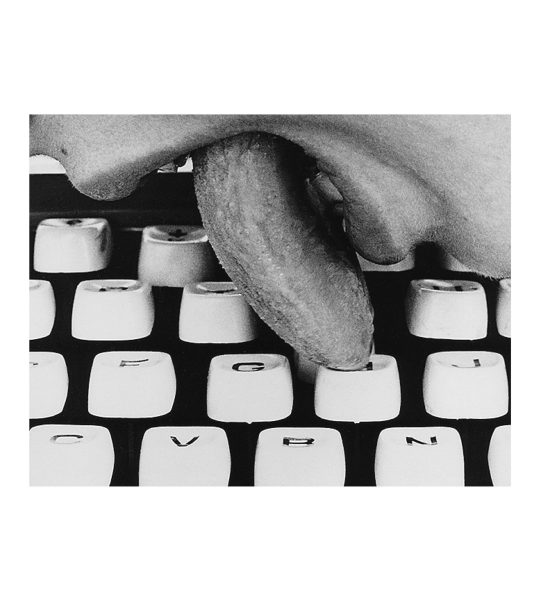
Women in Concrete Poetry: 1959-1979
Artists and writers include Lenora de Barros, Ana Bella Geiger, and Mira Schendel from Brazil; Mirella Bentivoglio, Tomaso Binga, Liliana Landi, Anna Oberto, and Giovanna Sandri from Italy; Amanda Berenguer from Uruguay; Suzanne Bernard and Ilse Garnier from France; Blanca Calparsoro from Spain; Paula Claire and Jennifer Pike from the UK; Betty Danon from Turkey; Mirtha Dermisache from Argentina; Bohumila Grögerová from the Czech Republic; Ana Hatherly and Salette Tavares from Portugal; Madeline Gins, Mary Ellen Solt, Susan Howe, Liliane Lijn, and Rosmarie Waldrop from the US; Irma Blank and Ruth Wolf-Rehfeldt from Germany; Chima Sunada from Japan; and Katalin Ladik and Bogdanka Poznanović from the former Yugoslavia
Edited by Alex Balgiu and Mónica de la Torre
#Lenora de Barros#Ana Bella Geiger#Mira Schendel#Mirella Bentivoglio#Tomaso Binga#Liliana Landi#Anna Oberto#Giovanna Sandri#Amanda Berenguer#Suzanne Bernard#Ilse Garnier#Blanca Calparsoro#Paula Claire#Jennifer Pike#Betty Danon#Mirtha Dermisache#Bohumila Grögerová#Ana Hatherly#Salette Tavares#Madeline Gins#Mary Ellen Solt#Susan Howe#Liliane Lijn#Rosmarie Waldrop#Irma Blank#Ruth Wolf-Rehfeldt#Chima Sunada#Katalin Ladik#Bogdanka Poznanović#library
51 notes
·
View notes
Text
"[...] Translators are forced to separate what cannot be separated. Translators are forced to kill the original - and then to try to resurrect, to reproduce, recreate it" - Rosmarie Waldrop in 'Translating The Sound In Poetry: Six Propositions'
#Quotes#Translation#Translation Studies#Translation Theory#Poetry#Poetry translation#Sorry but the image of the translator as a Viktor Frankenstein type character is amazing#Me running electricity through my translation: IT'S ALIIIIVE
217 notes
·
View notes
Note
I was watching a video on Youtube of someone criticizing the anti-aging advices shorts on Tiktok and my mind went to Hob, the immortal 30-something, being horrified at people being afraid of growing old with a hint of jealousy as he knows that aging is something that he will never experience.
I went down SUCH a mental rabbit whole of "what even is aging, actually?" while trying to answer this. Like, is aging one's relationship with time? Because Hob definitely gets older numerically as time passes, even if his body doesn't change. Is aging about one's relationship with death, and its nearness? Or is aging about one's relationship to their body? Or is it all of the above?
Because if you are mortal, like... all real people, time does leave a mark on the body. But to say that aging is the body's decay is too simplistic because physical disability also changes your body's functioning without being solely associated with aging (though some disabilities do get worse with age so it's not separate either). Aging-related cosmetic content online is focused on not "looking old" but going from a child to a young adult is also aging, and makes you look older but not "aged" so to speak. When it comes to death, aging does bring you closer to death, but death can also come at any time, whether you're "old" or not.
So I thought about it a lot (too much) and I thought about Sandman as a story about stories, and how the story of a life has a natural arc to it, a rise and fall, and how that is what Hob doesn't experience. He lived through the rising arc of his life but there is never a proper falling arc, a conclusion. There are ups and downs, minor climaxes. But it always returns to this plateau that keeps going straight rather than ultimately falling to an ending.
And... I am trying to see whether I think Hob would be jealous of this or not. Curious, for sure, because he's curious about pretty much every experience. And I think there is some melancholy whenever he loves someone and they age past him, some thought of it would be nice if we could stay on the same life path, at least for a while. And I'm sure he's cared for elderly people at various points in his life too, and seen people age, and die of old age, and held their hands and been through that moment with them. And... I do think he would feel for these very young people becoming so concerned over appearance in the sense that it can take away from actually living life. Hob is all about experiencing life, not, you know, avoiding laughing so you won't get wrinkles. In that respect, I think he would want those young people to really live and appreciate those years instead of spending them fearing what's to come.
The only feeling I can associate with Hob when it comes to aging is gratitude, actually. Not even in relation to physical appearance. But gratitude that he gets to continue on and avoid the downward arc of the conclusion of a life. Although I think that very situation is disturbing to Dream, who's in kind of the same boat, I think Hob might say "well why should a story have an ending anyway?"
There's really only one thing that lingers, and it's the question -- what happens after? It's the one subject of curiosity Hob absolutely cannot sate without giving up all the rest. Do I think it haunts him? No, not really. Tickles the back of his mind sometimes, though, probably.
I think of this poem Aging by Rosmarie Waldrop:
Distant galaxies are moving away from us. Friends, lovers, family. Even the sky shifts toward red. Where every clearness is only. A more welcoming slope of the night. And I don't remember why I opened the door.
Pretty much every door in life is open to Hob if he's willing to commit enough time and effort to it. Except for maybe the most major one. And everybody else lives with this inevitability. Except Hob. Which... well, rejecting inevitability is kind of how he got himself into that situation in the first place. So it tracks. And it's what makes Hob's story so interesting because what is a life without inevitability like? Or, you know, a story without an ending?
#hob: stories should just continue forever :)#dream: *EXTREMELY STRESSED*#just thoughts and stuff#ask#anonymous#hob gadling
65 notes
·
View notes
Text
A poem, being an instance of language, hence essentially dialogue, may be a letter in a bottle thrown out to sea with the—surely not always strong—hope that it may somehow wash up somewhere, perhaps on a shoreline of the heart.
—Paul Celan, from “Speech on the Occasion of Receiving the Literature Prize of the Free Hanseatic City of Bremen” (1958), trans. Rosmarie Waldrop
389 notes
·
View notes
Text
Dreams, like memories, are shores we row toward to escape the ever same tomorrow and their cruel futility. Days which cannot express themselves are grey and cold. Mute days whose untidy gestures tear us apart.
— Edmond Jabès, The Book of Questions Volumes 2 and 3: The Book of Yukel Return to the Book, trans.by Rosmarie Waldrop. Wesleyan University Press, 1977 (via The Vale of Soul Making)
10 notes
·
View notes
Text
Even with such disturbances, your gaze strangely gentle.
— Friederike Mayröcker, The Vienna Group: Six Major Austrian Poets, transl by Rosmarie Waldrop & Harriet Watts, (1985)
#Austrian#Friederike Mayröcker#The Vienna Group#Six Major Austrian Poets#Rosmarie Waldrop#Harriet Watts#(1985)
12 notes
·
View notes
Text
A Valentine That Can’t Be Sent
by Rosmarie Waldrop
1
Your singular, my love. Rehearses its absence.
You see light, hear noise, feel the warmth of the sun. Do you connect it into “day”?
You move through shards and splinters. Toward.
You are no longer possible.
2
Because, my love. The night such a vast space. And you a bird in oblique flight.
I try to hold on. To moments still ours. Even as they slip away.
Each word of yours, each gesture, gently. Once upon no more.
Do not fall again. Not even like an apple in autumn.
3
Because we say: we. We are each hour and each minute. Not altogether alone.
I have looked deep in the eyes of men and women. And feared that lastly. We make no contact.
And yet. The space between.
Can fill with love.
4
I no longer know what to think. About death. Which stands ready.
About you. A hunger hallucinating outward. From the ruins of memory.
Because yes, you. Still make my heart beat.
Irregularly. Like yours.
#beautiful words#love#heart#warmth#sun#light#irrgular#like yours#you make my heart beat#poetry#poem#rosemarie waldrop#A Valentine That Can't Be Sent
3 notes
·
View notes
Text
That nothing is the foundation of everything. That matter is constructed from it. That everything that exists is a complex enfolding of the underlying substrate of empty space. A universe of “nothing but structured nothingness.”
Rosmarie Waldrop - 'Overtaken by Nothingness'
2 notes
·
View notes